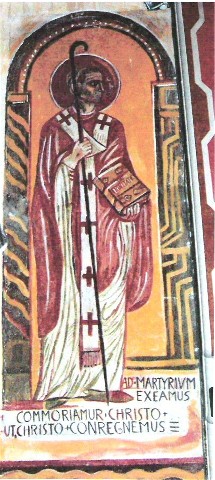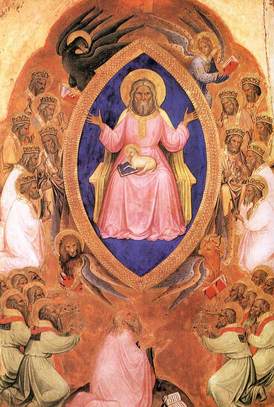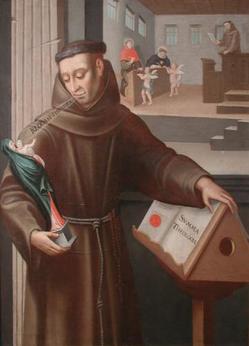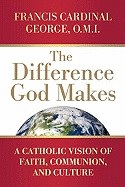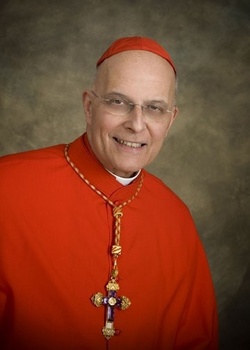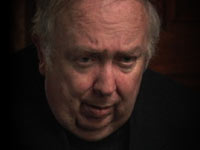 Monsignor Lorenzo Albacete was interviewed by PBS’s Frontline on the 9/11 tragedy.
Monsignor Lorenzo Albacete was interviewed by PBS’s Frontline on the 9/11 tragedy.
Tag: God
Artistic expression is part of that “way of beauty” that leads to God
Pope Benedict gave the following teaching on beauty –a subject near to his heart– on August 31. Some of the paragraphs are here (the entire address is here). Isn’t what the Pope says true???? The beautiful expressed in food, music, art, architecture, the human body, the poerty and friendship is the extroversion of the Holy Spirit.
Today, I would like to consider briefly one of these channels that can lead us to God and also be helpful in our encounter with Him: It is the way of artistic expression, part of that “via pulchritudinis” — “way of beauty” — which I have spoken about on many occasions, and which modern man should recover in its most profound meaning.
Perhaps it has happened to you at one time or another — before a sculpture, a painting, a few verses of poetry or a piece of music — to have experienced deep emotion, a sense of joy, to have perceived clearly, that is, that before you there stood not only matter — a piece of marble or bronze, a painted canvas, an ensemble of letters or a combination of sounds — but something far greater, something that “speaks,” something capable of touching the heart, of communicating a message, of elevating the soul.
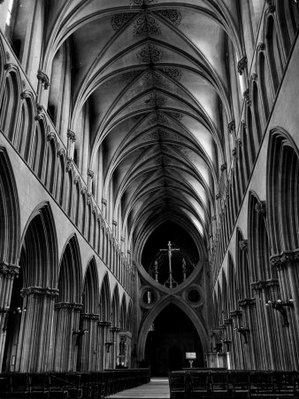 A work of art is the fruit of the creative capacity of the human person who stands in wonder before the visible reality, who seeks to discover the depths of its meaning and to communicate it through the language of forms, colors and sounds. Art is capable of expressing, and of making visible, man’s need to go beyond what he sees; it reveals his thirst and his search for the infinite. Indeed, it is like a door opened to the infinite, [opened] to a beauty and a truth beyond the every day. And a work of art can open the eyes of the mind and heart, urging us upward.
A work of art is the fruit of the creative capacity of the human person who stands in wonder before the visible reality, who seeks to discover the depths of its meaning and to communicate it through the language of forms, colors and sounds. Art is capable of expressing, and of making visible, man’s need to go beyond what he sees; it reveals his thirst and his search for the infinite. Indeed, it is like a door opened to the infinite, [opened] to a beauty and a truth beyond the every day. And a work of art can open the eyes of the mind and heart, urging us upward.
Continue reading Artistic expression is part of that “way of beauty” that leads to God
A Still Small Voice: meeting God
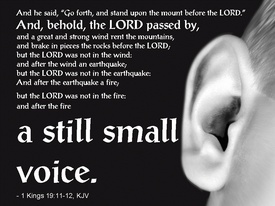 The first reading from today’s Scripture readings at Mass call us to reflect on how Revelation is made known to us; in what ways do we meet God? How are we to understand the teachings of the many saints and others who have claimed to have encountered God? Knowing who are true visionaries is rather difficult, I have to say, and some are even frauds. The credibility of the witness is so crucial here since we only have indirect knowledge of God because only Jesus’ Mother (and family) and apostles had direct experience of Him, how can we talk about an encounter with the Lord. One way to wrap our minds around meeting the Divine Majesty is to listen, in part, to Father Benedict Groeshel:
The first reading from today’s Scripture readings at Mass call us to reflect on how Revelation is made known to us; in what ways do we meet God? How are we to understand the teachings of the many saints and others who have claimed to have encountered God? Knowing who are true visionaries is rather difficult, I have to say, and some are even frauds. The credibility of the witness is so crucial here since we only have indirect knowledge of God because only Jesus’ Mother (and family) and apostles had direct experience of Him, how can we talk about an encounter with the Lord. One way to wrap our minds around meeting the Divine Majesty is to listen, in part, to Father Benedict Groeshel:
The best lesson one may learn from these authenticated and canonized visionaries is to do what you are supposed to do and leave the rest to God. The fulfillment of duty is the guiding principle of any decent moral life, in any religion of the world, because it expresses the natural law and is completely consistent with the revealed law of God. The fulfillment of duty placed before us by the providential circumstances of life, as we are guided by the commandments and the teaching of the gospel, is the straight road to God. Along that road any valid religious experience which occurs may be useful.
Created good and love by God
Going along in my uncertainties I muddle over questions of life that affect me on the spiritual level. Perhaps others do the same. One of the things that Father Carrón is asking in his 2011 retreat for the Fraternity of Communion and Liberation is: do we recognize that despite our human weakness, or failings, that Christ still loves every part of me? Yes, but not always. Sometimes it is difficult to be aware such an expression of the Other. Why this is so, I am still trying to figure out. Let me know when you get the answer. The Abbot of Christ in the Desert in New Mexico writes a weekly online column which is often insightful. The following is a portion of that column that used for reflection:
Some people are insistent at times, to me, that it is
impossible any longer to lead a truly chaste and celibate life. My general
reply is that it has always been more or less impossible and is only truly
possible when there is a strong faith and a deep commitment to the Lord and a
trust that God will give us the strength that we need. Without a doubt that
have always been failures and there will always be failures, but that is to be
taken for granted in the human condition. Repentance and conversion are a part
of any Christian life and are always values and realities that struggle against
the brokenness that we find within us.
There is no doubt that all of us are
created good and that God always loves us. Our own understanding of ourselves,
though, helps us understand that our goodness has been compromised by others,
by ourselves and by situations outside of our control. The gifts of repentance
and conversion help us in our struggle against all within us that has been
compromised.
This gift of the capacity to struggle against our brokenness is
one of the gifts of salvation given to us in Christ Jesus. Jesus is a model for
us in His humanity because He lived for truth and for the glory of His Father.
Jesus won and wins salvation for us by giving Himself up to death and by rising
from the dead.
Father Philip,
Abbot of Christ in the Desert Monastery
Saint Hilary of Poitiers
Saint Hilary worked tirelessly to defend the faith from wrong-thinking Christians, typically called heretics. What follows is Hilary’s teaching on God the Father.
It is the Father from whom everything that exists has been
formed. He is in Christ and through Christ the source of all things. Moreover,
His being is in Himself and He does not derive what He is from anywhere else,
but possesses what He is from Himself and in Himself. He is infinite because He
Himself is not in anything and all things are within Him; He is always outside
of space because He is not restricted; He is always before time because time
comes from Him…. But, God is also present everywhere and is present in His
entirety wherever He is. Thus, He transcends the realm of understanding,
outside of whom nothing exists and of whom eternal being is always
characteristic. This is the true nature of the mystery of God; this is the name
of the impenetrable nature in the Father.
(On the Trinity, Bk. 2, Ch.6; ML 10,
54; FC XXV, 39-40)
The Liturgical prayer for Saint Hilary may be prayed here.
God Today: With Him or Without Him Everything Changes
Almost two weeks ago Pope Benedict sent a message to the president of the Italian Bishops’ Conference, Angelo Cardinal Bagnasco, who is chairing a meeting where the agenda is talking about God, of all things. Well, it beats talking about bishops, nuns and the environment all the time. This topic interests me not in the sense of mere curiosity but because it is taking seriously my seeking the face of God (this topic ought to concern all people who consider themselves Catholic, spiritual and/or religious). To say God interests me sounds like an academic exercise; it is and it is not entirely that. God is interesting to me because seeking God is like no other search I know of, for it concerns my entire self and it intersects all that I do in the world. Is God totally unknowable, the Mystery and desirous of a personal relationship with me (and you)? The Pope makes some great points in these few paragraphs. The curious points are emphasized below.
On the occasion of the Congress “God Today: With or
Without Him Everything Changes,” which is taking place in Rome from
December 10-12, I wish to express to you, venerated Brother, to the Italian
Episcopal Conference and, in particular, to the Committee for the Cultural
Project, my profound appreciation for this important initiative, which
addresses one of the great topics that has always fascinated and questioned the
human spirit.
The question of God is also central in our time, in which man is
often reduced to one dimension, the “horizontal,” considering
openness to the Transcendent as irrelevant for his life. The relationship with
God, instead, is essential for humanity’s journey and, as I have had the
occasion to affirm many times, the Church and every Christian, in fact, have
the task to make God present in this world, to attempt to open to men access to
God.
Planned from this perspective is the international event of these days.
The breadth of the approach to the important topic that characterizes the
meeting, will make possible the sketching of a rich and articulated picture of
the question of God, but above all it will be a stimulation for a profound
reflection on God’s place in the culture and life of our time.
On one hand, in
fact, an attempt is being made to show the different ways that lead to
affirming the truth about the existence of God, that God which humanity has
always known in some way, even in the chiaroscuro of his history, and who
revealed himself with the splendor of his face in the covenant with the people
of Israel and, beyond that, in every measure and hope, in a full and definitive
way, in Jesus Christ.
He is the Son of God, the Living who enters into the life
and history of man to illumine him with his grace, with his presence. On the
other hand, the desire is precisely to bring to light the essential importance
that God has for us, for our personal and social life, for understanding
ourselves and the world, for the hope that illumines our way, for the salvation
that awaits us beyond death.
Directed to these objectives are the numerous
interventions, according to the many points of view which will be the object of
study and exchange: from philosophical and theological reflection on the
witness of the great religions; from the impulse to God, which finds its
expression in music, literature, the figurative arts, the cinema and
television; to the development of the sciences, which attempt to read in depth
the mechanisms of nature, fruit of the intelligent work of God the Creator; from
the analysis of the personal experience of God to the consideration of the
social and political dynamics of an already globalized world.
In a cultural and
spiritual situation such as the one we are living in, where the tendency grows
to relegate God to the private sphere, to consider him irrelevant and
superfluous, or to reject him explicitly, it is my heartfelt hope that this
event might at least contribute to disperse that semi-darkness that makes
openness to God precarious and fearful for the men of our time, though he never
ceases to knock on our door.
The experiences of the past, although not remote
to us, teach us that when God disappears from man’s horizon, humanity loses its
direction and runs the risk of taking steps to its own destruction. Faith in
God opens man to the horizon of certain hope, which does not disappoint; it
indicates a solid foundation on which to base life without fear; it calls for
abandoning oneself with confidence in the hands of the Love which sustains the
world.
To you, cardinal, to all those who have contributed to prepare this
congress, to the speakers and to all the participants I express my cordial
greeting with the desire for the full success of the initiative. I support the
works with prayer and with my apostolic blessing, propitiator of that light
from on High, which makes us capable of finding God, our treasure and our hope.
The essence and undivided nature of charity by John Duns Scotus
The second reading in the Office of Readings from today’s liturgical memorial [even though it is Sunday in 2009 and Sunday takes precedence over saints’ memorials] of Blessed John Duns Scotus bears posting here. What appears to be vague really is dead-on in thinking about charity and justice. Emphasis mine.
The Difference God Makes: A Catholic Vision of Faith, Communion and Culture
Join us for a dialogue with Francis Cardinal George, O.M.I. on the publication of
The Difference God Makes: A Catholic Vision of Faith,
Communion, and Culture
Moderated by Monsignor Lorenzo Albacete,
Theologian,
Author, Columnist
Wednesday, October 21, 2009 at 7:00PM
The Metropolitan Club, 1 East 60th Street (corner of 5th
Avenue), NYC
·RSVP AND PROPER ATTIRE REQUIRED. No T-shirts, sneakers, or jeans. For men, jackets and ties required. Clerical
dress or religious habits permitted.
·To make a reservation, send an e-mail to RSVP@crossroadsnyc.com with
full name and address.
Presented by Crossroads Cultural Center, The American Bible
Society and The Lumen Christi Institute
His Eminence, Francis Cardinal George, 72, the Cardinal-Archbishop of Chicago since 1997, is widely
recognized as a leading intellectual figure in the American Catholic
hierarchy. His new book, The Difference God Makes: A Catholic
Vision of Faith, Communion, and Culture, brings together some of his most
influential writings on the Catholic vision — not just of the Church herself,
but also of all the peoples of the world.
Weaving together intellectual insight and personal wisdom,
this investigation offers a luminous Catholic vision of communion, illustrating
the Church’s relation to numerous religions as well as the secular
world. Drawing from both the author’s observations of Catholicism in
cultures around the globe and countless theologians’ perspectives–including
Popes John Paul II and Benedict XVI, Thomas Aquinas, and Francis of Assisi–this
analysis demonstrates how to recognize the self-giving, liberating God who
provides freedom from the competitive, oppressive gods of secular
modernity. This overview also recalls an assortment of fascinating
stories, from a poignant moment with a non-Christian in Zambia to the humbling
dedication of volunteers who came to observe Pope John Paul II’s visit to
Mexico City.
Confronting controversial issues head-on, this volume will
inspire Christians everywhere while also offering non-Christians a renewed
understanding of what a lived Christianity means for political and personal
life today.
Cardinal Paul Cordes: can we defeat evil?
Today I had the opportunity to hear Paul Josef Cardinal Cordes deliver an address at
 Seton Hall University, “To Defeat Evil–Possible?” at a ceremony which bestowed an honorary doctorate of humane letters on him. The 71 year old prelate hails from the Archdiocese of Paderborn, Germany, though he has worked at the Vatican since 1980. Pope Benedict made him a cardinal in November 2007.
Seton Hall University, “To Defeat Evil–Possible?” at a ceremony which bestowed an honorary doctorate of humane letters on him. The 71 year old prelate hails from the Archdiocese of Paderborn, Germany, though he has worked at the Vatican since 1980. Pope Benedict made him a cardinal in November 2007.
Cardinal Cordes is the president of the Pontifical Council Cor Unum (One Heart) for Human and Christian Development established by Pope Paul VI in 1971. The work of Cor Unum, virtually unknown to many Americans, demonstrates in concrete ways “the care of the Catholic Church for the needy, thereby encouraging human fellowship and making manifest the charity of Christ.”
The Cardinal said that sentimentality is unhelpful when it comes to religious and concrete reality; sentimentality allows us to slumber and therefore overlook evil. Look at the well known events of human history to see the effects of the human capacity for evil. The one bomb that still needs to be defused is that of the all-consuming anger in the heart of men and women. Today we continue to demand an answer that promotes real peace. The UN and other socio-political organizations can’t do the heavy lifting in eradicating evil: we need a concrete proposal that unveils the many sources of injustice, the psychological problems faced by man and woman and false religion. To zero-in on the serious issues of life that are born of the heart. What often happens and is rather unsatisfactory is dealing with life from the angle of empirical data alone. The Christian needs to step up to the plate approach these questions, particularly evil, from the approach of divine revelation.
